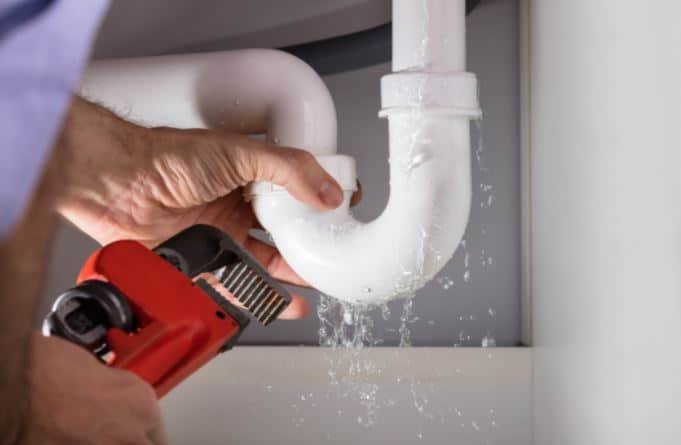Home Improvement
6 Common Plumbing Concerns for Winter

Frigid weather brings its own set of challenges for property owners. Many bad things are bound to happen to your plumbing system when temperatures reach freezing levels. Properties with old plumbing systems are especially susceptible.
Now, before disaster strikes, it’s helpful to be cognizant of things that can go wrong. It can help with scheduling routine maintenance before the start of winter. Becoming familiar with potential problems gives you a bit of information about what to do when you are stuck in a plumbing emergency in the dead of winter.
[lwptoc]
Keep an eye out for frozen exterior pipes
Exterior pipes should be winterized to avoid freezing. Winterizing pipes entails pumping away water from the pipes. The service is often provided by lawn companies, and they use compressors to blow away excess water from pipes.
For exterior pipes that are prone to freezing, it’s essential to look into the possibility of insulating them by adding a heat barrier. You can also implement other measures such as upgrading to frost-free bibbs. Indoor pipes may not need to be winterized as you will be using them for water supply during the cold season. But as you’ll see shortly, they are not entirely immune to freezing problems.
Frozen indoor pipes
So, at what point does an indoor pipe freeze? It may happen when temperatures fall below 20° Fahrenheit. This may be occasioned by leaks that allow cold air inside the home. Even tiny openings can contribute to this problem.
Temperatures in unheated houses or areas can similarly contribute towards frozen indoor pipes. So, how do you start preparing and how can you prevent this problem from affecting you? If a pipe is especially susceptible to freezing, you can leave it dripping, which essentially avoids stagnant water. It’s also important to insulate pipes in unheated spaces. Seeking the services of a plumber with the teamemergencyplumber.com to install a pressure relief valve can help guard against pipe bursts. You can occasionally open cabinets or leave doors to unheated spaces open to promote airflow.
Sink Clogs
This may come as an unexpected surprise but sink clogs are on the top list of service calls around winter. That’s because winter coincides with the busiest holiday season for the year. Many families will have guests over, and they will cook a lot of meals. They will also have to wash a lot of dishes, meaning that they may put down the wrong things in drains or garbage disposal units. Now, you should remain vigilant by avoiding disposing of certain foods down the drain such as oil, grease, eggshells, pasta, bones, vegetable peels, uncooked rice, coffee grounds, or flour.
Read more: 6 Ways To Prevent Major Plumbing Disasters
Water heater malfunctions
You should take the health of your water heater quite seriously, as it may be prone to malfunctioning particularly during winter. That’s because hot water usage tends to increase during the cold season. The water heater may consequently experience problems such as failing to supply enough hot water. Failing to maintain the water heater tank properly by performing routine maintenance or draining the sediment occasionally may cause issues such as tank leaks. When it gets too cold in an unheated basement, inlet pipes may even freeze. The first step to preparing for winter is to have a plumber inspect the water heater to pre-empt any problems that may arise. Inlet pipes should also be insulated and the output of the water heater tank should be appropriately matched to the building’s inhabitants.
Outdoor drain damage & clogs
During winter, all the action will be outside. So, it’s no surprise that outdoor drains may become susceptible to damage or clogging. For instance, ice may collect in vent pipes in turn clogging them. Drains made from plastic or PVC may break as extremely low temperatures make them brittle. Your rain gutters may also become clogged as a result of autumn leaves accumulating. Snow may also cause weight-loading damage to gutters. You can start by minimizing debris around drains before snowfall. It may be expedient to upgrade to galvanized steel metal drains. Clearing snow and ice can also help with preventing weight-bearing damage.
Sump pump issues
The sump pump is often hidden away in the basement. It is easy to forget that it’s actually there until a heavy snowmelt result in basement flooding issues. Inspecting the sump pump starts from the foundation drain that goes around the house. You should make sure that it’s clear of any debris. Next, you should have a look at the sump pit, again checking for any debris. Remember that there’s also a likelihood of water freezing in the sump pit, so you should regularly have a look in the basement even if it’s unheated. Also, implement efforts to keep snow away from the foundation drain to ease the pressure on the sump pump. A plumber should also carry out an inspection to make sure that the sump pump is working.
There are many other things that could go wrong but these are some of the top issues to keep an eye out for. Involving a professional plumbing service in your winter preparation can also help to mitigate costly damage or silly mistakes.
Check out: Why is Plumbing a Worthy Profession?
-

 Entertainment4 weeks ago
Entertainment4 weeks ago123Movies Alternatives: 13 Best Streaming Sites in 2026
-

 Entertainment1 month ago
Entertainment1 month ago13 Free FMovies Alternatives to Watch Movies Online in 2026
-

 Entertainment1 month ago
Entertainment1 month ago13 Flixtor Alternatives to Stream Free Movies [2026]
-

 Entertainment1 month ago
Entertainment1 month agoGoMovies is Down? Here are the 11 Best Alternatives





